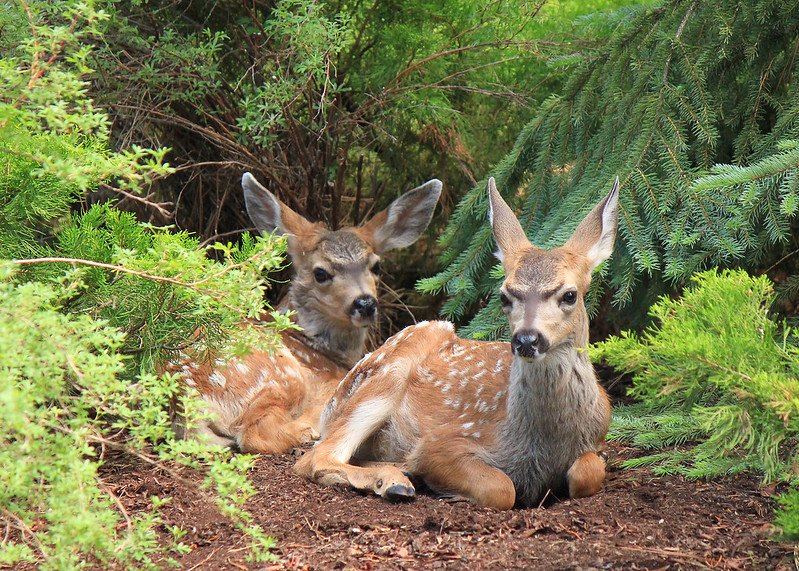ODFW: Young wildlife are rarely orphaned, so please leave them where you find them

And keep your pets away, too, agency urges
SALEM, Ore. (KTVZ) -- Memorial Day weekend marks the unofficial start of summer—and birthing season for Oregon's elk and deer herds. Elk calves and deer fawns are born from late May through mid-June.
Fawns and calves are most vulnerable to predation in their first few weeks of life, when they can't run with the herd. Their mothers will hide them in brush and go off to forage for food some distance away, sometimes for long periods so as to not call attention to their young. (A fawn or calf's spotted coat helps camouflage them as they stay motionless except when nursing. They also have very little odor as another protection against attracting predators.)
But each year, well-intentioned people mistake a young fawn or calf hidden by its mother as permanently abandoned or orphaned and remove it from the wild to "save" it. Instead, this action drastically reduces its chance to survive in the wild. When removed from the wild, the animal misses the chance to learn where to seek cover, what to eat and how to escape from predators and other dangers.
"Sadly, we see dozens of fawns and calves that have their lifespan drastically shortened each year because people don't understand they aren't actually orphaned," said Brian Wolfer, Oregon Department of Fish and Wildlife's Wildlife Program Manager. "Please never assume a calf, fawn or other young animal is orphaned. Don't remove it from the forest, or your backyard."
When wildlife biologists get the call that someone has picked one up, the advice is always the same: Put it back. "The best thing you can do is just to leave it alone and don't let your pets near it," continued Wolfer.
The outcome of a life in the wild is so much better than in captivity that ODFW will try to foster calves and fawns removed from the wild with other herds—putting the young animal back in the wild with a herd that isn't its own in hopes another animal will raise it. "Fostering is the next best option for a young calf or fawn removed from the wild that can't be returned to where it was taken from—and a better option than being in captivity," said Wolfer.
Pets should also be kept away from wildlife. Deer and elk see dogs as a threat to their young so may act aggressively in response. "Give deer and elk some extra room this time of year if possible to prevent any conflict," said Wolfer.
Because of the damage it can do to both wildlife and people, removing an animal from the wild is illegal under Oregon wildlife laws. (ORS 497.308 – No person shall remove from its natural habitat or acquire and hold in captivity any live wildlife in violation of the wildlife laws.)
A male deer fawn that weighs under 8 pounds at birth can grow to 280 pounds. Deer and elk are naturally wary of humans—but if removed from the wild and raised by people they lose that fear and can go on to behave aggressively and threaten people.
The advice to leave animals in the wild applies to all wildlife—including adult and young marine mammals that are commonly seen alone resting on rocks or the beach in spring and summer. Beachgoers are asked to stay away from resting seals and sea lions and keep dogs away from these animals as well. Marine mammal strandings should be reported to OSP's hotline at 1-800-452-7888.
If you are certain an animal is orphaned because you saw its parent die, please call ODFW, a licensed wildlife rehabilitator or OSP for advice.
